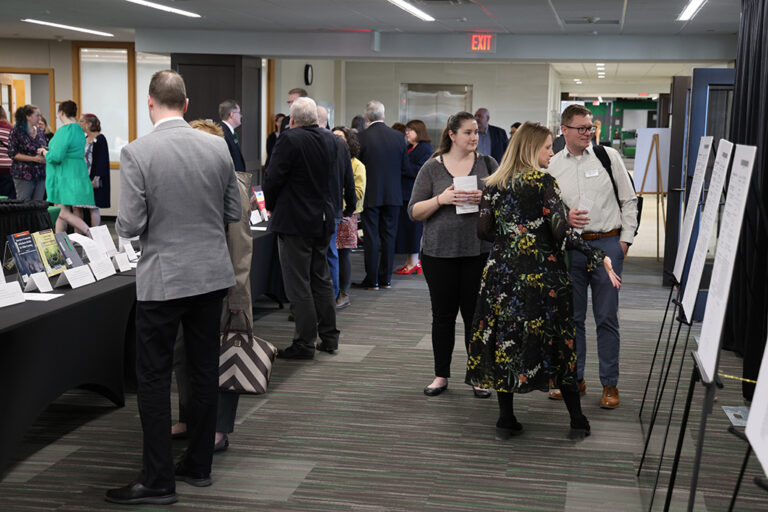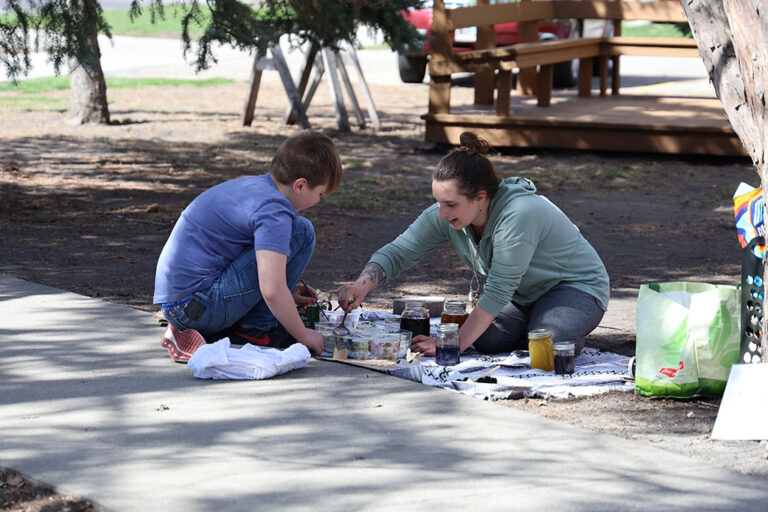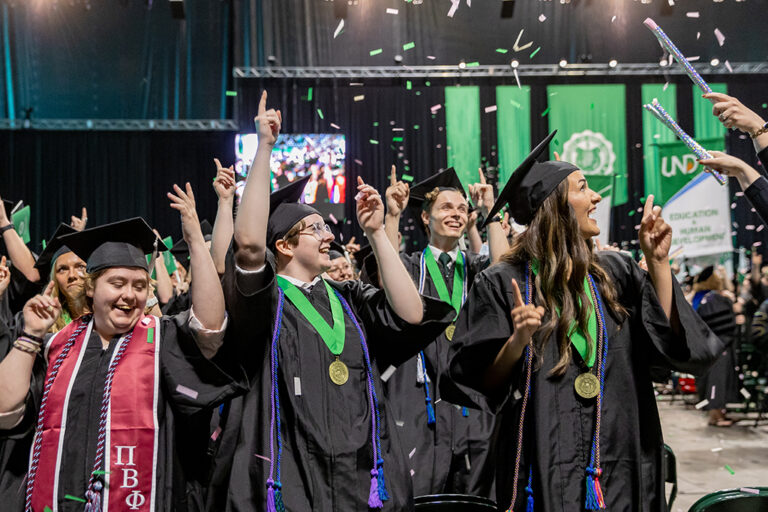Teaching & Leadership graduate program in a class all its own
Teacher-students tackle real-time ‘problems of practice’ in new partnership with Grand Forks Public Schools

Educational leaders from UND and the Grand Forks Public School District had plenty to share and to celebrate recently as they filled the Gershman Graduate Center for their first “Grand Gathering” event marking the beginning of a new graduate program and community partnership.
“You’re officially scholar-practitioners now,” said UND Associate Professor Laura Link, director and lead designer of the 30-credit Teaching & Leadership master’s program as well as the new Mastery Learning Graduate Certificate.
“As part of the scholarly community working in a research-practice partnership, you’ll be addressing real problems of practice within your own classrooms and school district,” Link said. “You’ll lead the charge as you answer the call to change business as usual. You will be the ones to pioneer new ways for UND and the Grand Forks School District to work together.”
Grand Forks Public Schools Superintendent Terry Brenner, who teaches a course within the master program’s core curriculum, added his own high praise for the inaugural cohort he dubbed the “Sweet 16” — in reference to the number of K-12 teachers enrolled and now more than halfway through their first semester.
“You are our future, and it’s been fascinating to spend time with each and every one of you,” he told the students, who were applauded by the full house of partner educators and special guests — among them, members of the Grand Forks School Board as well as honored speaker Kathy Gershman, professor emerita of Educational Foundations & Research at UND’s College of Education & Human Development, and who along with her husband, Hal Gershman, is the namesake and benefactor of the Gershman Graduate Center itself.
“This collaborative relationship is so important in building teacher leadership capacity and addressing teacher retention,” Brenner said. “It’s been so exciting to see you continue to grow and learn as master teachers and as future leaders in all the new positions you aspire to in our School District and beyond.”
The first of five planned Grand Gatherings was part celebration, part review of progress and part classwork as the students broke into small groups to discuss talking points.

Easier said than done
Brenner said similar partnerships between UND and the School District have been discussed many times in the past, but never quite got off the ground. He recalled times when UND may have had a great grant opportunity and reached out to the district to find a partner. Still other times, grants might have fallen through.
“And sometimes when the heavy-lifting fell to us (the School District), we just didn’t have the personnel to help get it done,” Brenner said. “But here we are at implementation, and it feels great. We have 16 teachers enrolled, and we hope all of you are going to be ambassadors, too.”
Brenner was quick to credit Link, the grad student-teachers and the many partnering educators for the program’s early success.
“This opportunity was born out of conversations about investing in human capital and partnering with UND as the flagship university of North Dakota,” he said. “Dr. Link gave me some kudos and commendations, but she’s really the one who made this happen. She’s been central to everything — from the details of the programming to laying out the five semesters and the 13 different pathways for student success and leadership. Seeing the students so engaged in the whole program — that’s the exciting part. I’ve just been here to support it.”

In a class all its own
So, what makes the Master of Science in Teaching & Leadership unique from other graduate programs in education?
Link, who’s done extensive research in grading practices and who wrote The Conversation article “Every teacher grades differently, which isn’t fair,” says the program is unlike any other in the state and maybe even the nation because it was designed to “purposefully address the School District’s priorities, build new teacher-leader pathways and increase teacher retention.”
“The work of modern schools requires more leadership on deck in all capacities,” she said. “This program recognizes that we need more school-based leadership roles than principal and assistant principal. We’re preparing our graduate students to lead as master teachers in their schools and in other innovative roles that maximize student and teacher learning.”
Further, the grad students — representative of teachers in elementary, middle and high schools — take not only a comprehensive set of core classes in curriculum and instruction, but they also learn mastery skills in assessment, grading and reporting.
“Teachers spend more than a third of their time assessing and evaluating student work, yet there’s usually little to no university training in this area, leaving K-12 educators to figure it out on their own until now,” Link said. “We reshaped our core curriculum to prepare our students for the entire continuum of teaching and learning — from curriculum through grading and reporting. We reshaped our core classes to meet that vision.”
In addition to the core courses, the students choose from 13 different specialization areas ranging from Principalship, Instructional Coaching, Applied Data Research, STEM + Computer Science, Early Childhood, and Behavioral Supports in Special Education. They also have the choice of earning dual credit certification in a number of secondary education specializations focused on teaching students mathematics, biology, chemistry and physics.
The partnership is a win-win for UND and Grand Forks Public Schools, organizers say. For added value, students also can apply for a Mastery Learning graduate certificate, which allows them to earn stacked credentials within the same 30-credit master’s degree. Plus, UND waived the cost of tuition for the first and final semesters — what amounts to a 20 percent discount — while Grand Forks Public Schools agreed to cover the cost of books up to $100 each semester.
But all probably agree that one of the most important benefits yet is that the program will create a pipeline of experienced leaders while also boosting teacher retention during a time of unprecedented teacher shortages nationwide. In this case, the students sign a memorandum of understanding and agree to serve within the district for three years after graduation.
“And after they earn their master’s degree, they’re also going to make a lane change and see a salary increase,” Brenner said. “So whether these teachers stay in the classroom or transition into another leadership role, they’re going to be compensated and have more leadership opportunities.”
That increases the bottom line when it comes to teacher pensions, too.

Keeping one foot in both worlds
Joel Schleicher, student advisor and liaison between Grand Forks Public Schools and UND, shared with the group that there’s probably no one better suited to define problems of practice than the teachers who work with students in the classroom every day.
Before he joined UND as a clinical assistant professor with Teaching & Leadership, Schleicher worked 26 years for Grand Forks Public Schools, where he held multiple school and district leadership positions.
Now, he’ll work closely with the graduate students as they narrow their research focus and tackle problems of practice for their individual scholarly projects, which also must align with the strategic goals of the School District.
“If we’re doing a true partnership, your work should make a difference for your students and Grand Forks Public Schools,” Schleicher said. “That’s how you can have the biggest impact. That’s how you can become leaders in your schools and in your community. And that’s how you can drive and lead change.”
Added Link: “It’s not about simply reaching a destination like ‘when I make instructional coach or when I’m a master teacher’ and checking off a degree completion box. It is about right now. You are increasingly improving your knowledge and skills, building instructional confidence and enriching the community as you work toward earning this degree. We all benefit from your growth, and we can’t wait to see how you’ll make a lasting impact.”

And they’re already on a roll
At the first Grand Gathering, it was clear the graduate students were wasting no time in starting to brainstorm and build new partnerships.
In fact, when small groups separated for a breakout session to discuss ideas, at least one group was so enthusiastic that it lost track of time and had to be fetched from the study area in the lower level.
Here is some of what the grad students had to say about the program …
- Ellen Nowatzki, fifth-grade teacher at Discovery Elementary School: “Even though we’re at all different grade levels, we’re already finding we have connections for problems of practice. With so many different schools in the district, it was very interesting how similar our thoughts and visions were in thinking of ways we could create cohesiveness and align our curriculums while still allowing each school to own its individual identity. … This puts you back in that student role, so you get a whole different level of learning. It’s going to make me an even better teacher, and I’m excited to be that team leader for our school and our district and be a part of making change for the positive.”
- Krystal Johnson, social studies teacher at Central High School: “I also like the personal aspect of building that collegiality across the district — at all different levels and at different schools. Being able to develop friendships out of that is a huge, huge impact and benefit. I feel like teachers are on burnout mode. And one of the ways to help with that is to have people around you who are going through the same challenges. You can help each other through it, and that’s what this program already has done for me.”
- Nicole Levenseller, kindergarten teacher at Discovery Elementary: “We have to remember everybody’s a teacher, and everybody’s a learner. I’m excited about being able to be a leader in what I’m passionate about in my field and being able to share that with my teammates at Discovery and in the district.”
- Meghan Morris, kindergarten teacher at Discovery Elementary: “One of the biggest things I like is being able to learn new strategies that I can directly apply in my classroom to best help my young learners.”
>> Do you want to learn more about the master’s program in Teaching & Leadership? You can reach Laura Link at 701.777.5825 or laura.link@UND.edu or Joel Schleicher at 701.777.3187 or joel.l.schleicher@UND.edu.



